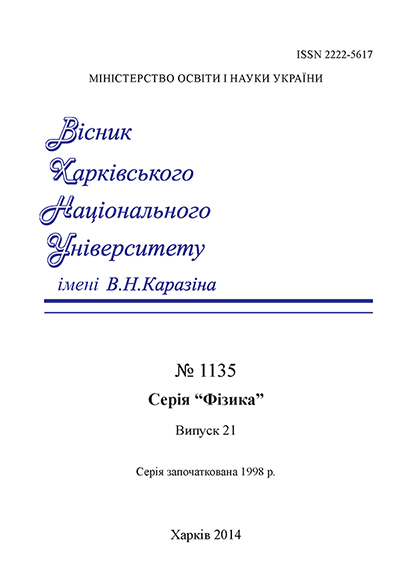The influence of zirconium oxide on Al2O3-TiC oxide-carbide ceramics
Keywords:
electrical resistance, oxide-carbide ceramics, percolation threshold, electrosintering
Abstract
Time-dependent change of electrical resistance for 56 vol. % Al2O3+36 vol. % TiC + 8 vol. % ZrO2 sample, obtained by means of electrical consolidation has been investigated in the article. The mechanism of carbon concentration change while compacting has been investigated and it was determined that under the condition that the content is 36 vol. % TiC, that slightly exceeds percolation threshold, it is possible to obtain a dense sample having grain shape different from spherical. That allows us to reach coordination number 4 to provide the percolation process possibility.
Downloads
Download data is not yet available.
References
Cutting tools equipped with superhard and ceramic materials and their use: Handbook / V.P. Zhed, G.V. Borovsky, Ya.A.Muzykant, G.M. Ippolitov. -Moscow: Mashinostroenie, 1987. – 320 p.
N.V. Novikov, A.I. Grabchenko, E.I. Gritsenko and others. The blade tools of superhard materials: Handbook / Ed. N.V. Novikov. - Kiev: Tehnіka. - 1988. -118 p.
Pat.6,617,271, US, Tungsten carbide cutting tool materials: USA, MCI C04 B 035/56 V.E.Kodash, E.S.Gevorkyan; Appl. 19.03.2002; Publ. 09.09.2003. - 14 p.
E.S.Gevorkyan, V.Y. Kodash, M.Kramer The study of properties of various cutting tool materials during processing of Ferrotitanit-S // High Technology in Mechanical Engineering: Collection of scientific papers NTU “KhPI.” - Kharkiv. - 2004. - Vol. 2 (a). - P. 59-64.
E.S. Gevorkyan. Prospects of application of the electrosintering method for compacting nanopowders to obtain composite materials for tool and
constructional purposes // Cutting and tool in technological systems: International Science and Technology collection. - Kharkov: NTU “KhPI”. - 2005 - Vol. 68. - P. 123-129.
S.Yu.Saenko, N.N. Belash, E.S.Gevorkyan. Obtaining nanoceramics based on zirconia dioxide by hot vacuum pressing. Physics and technology of high pressure. №1, Vol. 18. – 2008. – P. 47-51.
Clinard F.W. Jr., and Kempter C.P. J. Less-Common Met. 15, 59 (1968).
S.S.Kiparisov, Y. Levinsky, A.P. Petrov Titanium carbide: production, properties and application. Moscow: Metallurgiya, 1987. - 216 p.
Badwal S.P.S. Electrical conductivity of single crystal and polycrystalline yttria-stabilized zirconia // J. Mater. Sci. - 1984. - V. 19. - P. 1767 - 1776.
Filal M., Petot C, Mokchah M., Chateau C, Carpentier J.L. Ionic conductivity of yttriumdopped zirconia and the “composite effect” // Solid state ionics. - 1995. - V. 80. - P. 27 - 35.
Rossiter P.L. The electrical resistivity of metals and alloys. Cambridge University Press, 1987. 434 p.
N.V. Novikov, A.I. Grabchenko, E.I. Gritsenko and others. The blade tools of superhard materials: Handbook / Ed. N.V. Novikov. - Kiev: Tehnіka. - 1988. -118 p.
Pat.6,617,271, US, Tungsten carbide cutting tool materials: USA, MCI C04 B 035/56 V.E.Kodash, E.S.Gevorkyan; Appl. 19.03.2002; Publ. 09.09.2003. - 14 p.
E.S.Gevorkyan, V.Y. Kodash, M.Kramer The study of properties of various cutting tool materials during processing of Ferrotitanit-S // High Technology in Mechanical Engineering: Collection of scientific papers NTU “KhPI.” - Kharkiv. - 2004. - Vol. 2 (a). - P. 59-64.
E.S. Gevorkyan. Prospects of application of the electrosintering method for compacting nanopowders to obtain composite materials for tool and
constructional purposes // Cutting and tool in technological systems: International Science and Technology collection. - Kharkov: NTU “KhPI”. - 2005 - Vol. 68. - P. 123-129.
S.Yu.Saenko, N.N. Belash, E.S.Gevorkyan. Obtaining nanoceramics based on zirconia dioxide by hot vacuum pressing. Physics and technology of high pressure. №1, Vol. 18. – 2008. – P. 47-51.
Clinard F.W. Jr., and Kempter C.P. J. Less-Common Met. 15, 59 (1968).
S.S.Kiparisov, Y. Levinsky, A.P. Petrov Titanium carbide: production, properties and application. Moscow: Metallurgiya, 1987. - 216 p.
Badwal S.P.S. Electrical conductivity of single crystal and polycrystalline yttria-stabilized zirconia // J. Mater. Sci. - 1984. - V. 19. - P. 1767 - 1776.
Filal M., Petot C, Mokchah M., Chateau C, Carpentier J.L. Ionic conductivity of yttriumdopped zirconia and the “composite effect” // Solid state ionics. - 1995. - V. 80. - P. 27 - 35.
Rossiter P.L. The electrical resistivity of metals and alloys. Cambridge University Press, 1987. 434 p.
Published
2014-11-19
How to Cite
Gevorkyan, E. S., Khadzhay, G. Y., Vovk, R. V., & Melnik, O. M. (2014). The influence of zirconium oxide on Al2O3-TiC oxide-carbide ceramics. Journal of V. N. Karazin Kharkiv National University. Series Physics, 1135(21), 65-67. Retrieved from https://periodicals.karazin.ua/physics/article/view/7873
Issue
Section
Articles








3.gif)
